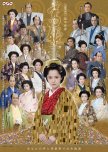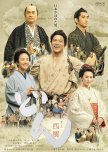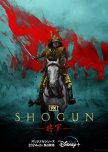
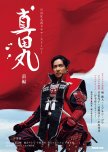
If you like Yabushige's character in Shogun, you may like Sanadamaru. This Taiga Drama shows a "sneaky" side of a samurai during the end of Sengoku Era, where they have to cleverly "switching sides" for the clan survival.
Sanadamaru also depicts the life of Taiko in his later years and how Ishida (Lord Ishido in Shogun) was desperately trying to corner Tokugawa (Toranaga) to the Sekigahara battle. The drama spans until the fall of Osaka castle.
Bonus: Ninja action, Christian depiction, Hosokawa Garcia (Mariko) appearance
Sanadamaru also depicts the life of Taiko in his later years and how Ishida (Lord Ishido in Shogun) was desperately trying to corner Tokugawa (Toranaga) to the Sekigahara battle. The drama spans until the fall of Osaka castle.
Bonus: Ninja action, Christian depiction, Hosokawa Garcia (Mariko) appearance

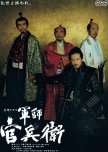
If you want to know the sentiment towards Taiko during his later years, Gunshi Kanbei has good depiction of it. This is important to understand why conflicts between Ishida and Tokugawa exist in the first place. Gunshi Kanbei is 85% following history while Shogun is 95% fiction.
Similarities: Kanbei was a Christian samurai so you will get good depiction of Japanese Christian during the time. However Kanbei character has not represented in Shogun.
Downside:
1. Gunshi Kanbei span over 50 episodes
2. Gunshi Kanbei doesn't focus much on Tokugawa (Toranaga in Shogun)
3. Gunshi Kanbei can't match the Shogun budget
Similarities: Kanbei was a Christian samurai so you will get good depiction of Japanese Christian during the time. However Kanbei character has not represented in Shogun.
Downside:
1. Gunshi Kanbei span over 50 episodes
2. Gunshi Kanbei doesn't focus much on Tokugawa (Toranaga in Shogun)
3. Gunshi Kanbei can't match the Shogun budget

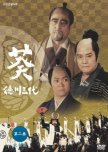
If you want to know more about Japan politics especially the conflicts after the death of Taiko, Aoi has the best depiction and it is also one of the best and comprehensive drama discussing Battle of Sekigahara, which is the final moment in Clavell's Shogun.
The difference is Aoi follows 90% of the actual history while Shogun as we know does not.
Bonus: Miura Anjin (Blackthorne) does have an appearance in Aoi
Downside:
1. Aoi is 49 episodes long and span over the 3 generations of Tokugawa
2. Aoi has low budget compared to Shogun for obvious reason
3. Aoi has old actors playing younger role
The difference is Aoi follows 90% of the actual history while Shogun as we know does not.
Bonus: Miura Anjin (Blackthorne) does have an appearance in Aoi
Downside:
1. Aoi is 49 episodes long and span over the 3 generations of Tokugawa
2. Aoi has low budget compared to Shogun for obvious reason
3. Aoi has old actors playing younger role
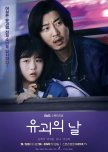

Different plots but both dramas have bratty girl character and due to certain circumstances an adult have to stay and take care of her.


Female leads in both dramas are Plain Jane. Their "strict and stylish" female bosses would later change them into Stylish Jane.
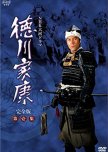

Both dramas portray Ieyasu as the protagonist, but Aoi is only focusing on the older Ieyasu (to be exact after Hideyoshi death). Both dramas however have different interpretations on the character, where TI is more on the whitewash version, while Aoi is skewed towards the "gray-character" which in my opinion more tally with the historical records.
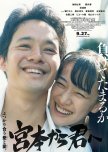
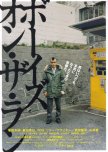
The main character in both movies had to confront with someone out of their league (in terms of fist fighting) for the sake of the woman they love. Both are adapted from "seinen manga" and good at portraying the anger and frustration of the main characters.
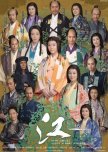

Aoi is another portrayal of Gou-Hidetada marriage life. However Aoi started off with both of them already married (i.e. it will not start from their childhood) and focused more on the affairs around Tokugawa big family as well as more details on Edo shogunate administrations.
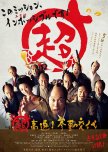
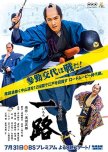
Both focus on Sankin Kotai and how it drains out Local Clan financial. If you're interested in this old Japanese samurai tradition, Ichiro will tells more on what is needed for a Sankin Kotai. Although there are differences between the two, where the time-line for Choukosaku was during the early implementation, while Ichiro was at a more later date.
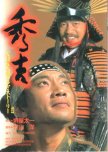

Since Kuroda Kanbei was the strategist for Hideyoshi, both dramas will share many similarities. Gunshi Kanbei tells more in depth on the western politics and spans until Sekigahara War. Takenaka Naoto also played as Toyotomi Hideyoshi in Gunshi Kanbei. Although the writing for the character was a bit different.

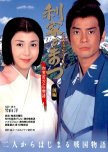
Toshiie and Matsu (TAM) is like a spin off of Hideyoshi in terms of writing, but told from the perspective of Toshiie/Matsu. Character of Matsu in TAM was much more like One in Hideyoshi.
Both dramas revolved around people of Satsuma Domain during Bakumatsu period, with mostly similar characters but written from different perspectives. Some actors in Atsu-hime also appeared in Sego-don but with different roles.


 1
1 1
1





















